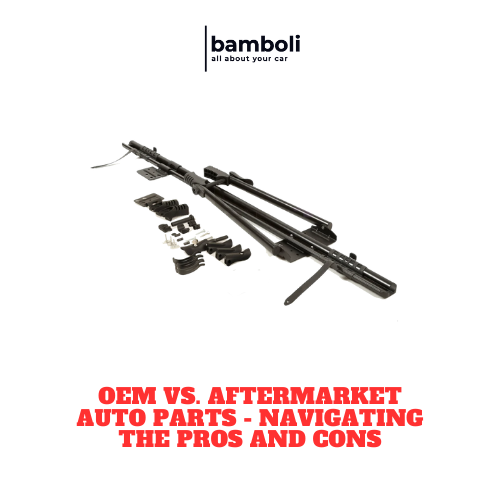OEM vs. Aftermarket Auto Parts - Navigating the Pros and Cons

Purchasing auto parts for your vehicle, you may be faced with the decision of choosing between OEM (Original Equipment Manufacturer) parts or aftermarket parts. Understanding the pros and cons of each option can help you make an informed decision that best suits your needs and budget.
Main Points:
- OEM Parts: These parts are made by the same manufacturer that produced the original parts for your vehicle. They are typically more expensive than aftermarket parts but are guaranteed to fit and function properly.
- Aftermarket Parts: These parts are produced by third-party manufacturers and are often less expensive than OEM parts. However, they may not always meet the same quality standards as OEM parts.
- Quality: OEM parts are generally of higher quality and are designed to exact specifications. Aftermarket parts may vary in quality, with some being comparable to OEM parts and others being subpar.
- Price: Aftermarket parts are usually more affordable than OEM parts, making them a popular choice for budget-conscious consumers. However, be wary of extremely cheap aftermarket parts, as they may be of lower quality.
- Availability: OEM parts are often readily available through authorized dealerships. Aftermarket parts can be found at a variety of retailers and online stores, offering more options for consumers.
Understanding OEM Auto Parts
Maintaining and repairing your vehicle, using OEM (Original Equipment Manufacturer) auto parts is crucial for optimal performance. But what exactly are OEM auto parts and why are they so important?
What are OEM Auto Parts?
OEM auto parts are components that are specifically designed by the original manufacturer of your vehicle. These parts are made to exact specifications and are guaranteed to fit and function properly in your car.
Why are OEM Auto Parts Important?
Using OEM auto parts offers several advantages:
- Quality: OEM parts are built to the highest quality standards, ensuring reliability and longevity.
- Compatibility: Since OEM parts are designed for your specific vehicle, they are guaranteed to fit perfectly and work seamlessly.
- Warranty: Many OEM parts come with a warranty, giving you peace of mind and protection in case of any issues.
Overall, choosing OEM auto parts for your vehicle is a smart investment that will help you maintain the performance, safety, and value of your car in the long run.
Exploring Aftermarket Auto Parts
Upgrading or repairing your vehicle, aftermarket auto parts play a crucial role. These parts are not produced by the original manufacturer of your vehicle, but they are designed to fit and function just like the original parts. In this article, we will explore the world of aftermarket auto parts and why they are a popular choice among car enthusiasts.
Benefits of Aftermarket Auto Parts
One of the key benefits of aftermarket auto parts is affordability. Since these parts are not produced by the original manufacturer, they are often available at a lower price point. This makes it easier for car owners to customize or repair their vehicles without breaking the bank.
Another advantage of aftermarket auto parts is the wide range of options available. Whether you are looking for performance upgrades, aesthetic enhancements, or replacement parts, you are sure to find what you need in the aftermarket market. This allows car owners to personalize their vehicles and create a unique driving experience.
Quality and Compatibility
While aftermarket auto parts may come at a lower price, it is important to ensure that they are of high quality and compatible with your vehicle. Before making a purchase, be sure to do your research and read reviews from other car owners. This will help you determine the reliability and performance of the aftermarket parts you are considering.
|
Pros |
Cons |
|
Affordable |
Quality may vary |
|
Wide range of options |
Compatibility issues |
Overall, exploring aftermarket auto parts can be a rewarding experience for car enthusiasts looking to upgrade or customize their vehicles. By choosing high-quality parts that are compatible with your vehicle, you can enhance performance, aesthetics, and overall driving experience.
Quality and Performance of OEM Parts
Purchasing parts for your vehicle, it is essential to consider the quality and performance of OEM (Original Equipment Manufacturer) parts. These parts are specifically designed and manufactured by the same company that produced your vehicle, ensuring a perfect fit and optimal performance.
Quality is a key factor when choosing OEM parts. These parts undergo rigorous testing and quality control processes to meet the manufacturer's standards. This ensures that you are getting a reliable and durable product that will last longer and perform better than aftermarket parts.
Moreover, OEM parts are designed to work seamlessly with other components of your vehicle, maintaining its original performance and efficiency. This translates to a smoother driving experience and fewer potential issues down the road.
Benefits of OEM Parts:
- Reliability: OEM parts are made to the highest quality standards, ensuring reliability and longevity.
- Performance: These parts are designed to optimize your vehicle's performance and fuel efficiency.
- Compatibility: OEM parts fit perfectly with other components of your vehicle, eliminating the risk of compatibility issues.
Overall, investing in OEM parts may cost a bit more upfront, but the long-term benefits in terms of quality, performance, and reliability make it a wise choice for maintaining your vehicle's optimal functionality.
Cost Considerations: OEM vs. Aftermarket Parts
Replacing parts for your vehicle, one of the key decisions you need to make is whether to choose OEM (Original Equipment Manufacturer) parts or aftermarket parts. Both options have their own set of advantages and disadvantages, but one of the main factors that often sway people towards aftermarket parts is cost.
Here are some important cost considerations to keep in mind when deciding between OEM and aftermarket parts:
Cost Comparison:
One of the main reasons why many people opt for aftermarket parts is because they are generally cheaper than OEM parts. This is especially beneficial for those on a tight budget or looking to save money on repairs.
Quality:
While aftermarket parts may be more affordable, it is important to consider the quality of the parts. OEM parts are designed specifically for your vehicle and are often of higher quality compared to aftermarket parts. This could potentially save you money in the long run by reducing the likelihood of future repairs.
Warranty Coverage:
Another factor to consider is warranty coverage. OEM parts usually come with a warranty from the manufacturer, providing you with added peace of mind in case anything goes wrong. Aftermarket parts may not always come with a warranty, so you may end up spending more money if the part fails.
Overall Value:
When considering the cost of OEM vs. aftermarket parts, it is important to weigh the upfront cost with the long-term value. While aftermarket parts may be cheaper initially, they may not last as long or provide the same level of performance as OEM parts. In the end, choosing OEM parts could potentially save you money by avoiding frequent replacements or repairs.
|
Consideration |
OEM Parts |
Aftermarket Parts |
|
Cost |
Higher upfront cost |
Cheaper |
|
Quality |
Higher quality, designed for specific vehicle |
Varying quality levels |
|
Warranty Coverage |
Usually comes with warranty |
May not have warranty |
|
Overall Value |
Potentially saves money in long run |
May require more frequent replacements |
Warranty and Support: OEM vs. Aftermarket Options
Choosing between OEM (Original Equipment Manufacturer) and aftermarket options for warranty and support, consumers often find themselves at a crossroads. While both options offer their own set of advantages and disadvantages, it is important to understand the key differences between the two.
OEM Warranty and Support
One of the main advantages of opting for OEM warranty and support is the reliability and quality that comes with it. OEM parts are designed to work seamlessly with the original equipment, ensuring a perfect fit and optimal performance. Additionally, OEM warranty typically provides better coverage and support in case of any issues.
Aftermarket Warranty and Support
On the other hand, aftermarket warranty and support options offer affordability and flexibility. Aftermarket parts are often cheaper than OEM parts, making them a cost-effective choice for consumers looking to save money. However, the downside is that aftermarket parts may not always meet the same quality standards as OEM parts, leading to potential compatibility issues or performance concerns.
In the end, the decision between OEM and aftermarket warranty and support options ultimately depends on your individual needs and preferences. If you prioritize quality and reliability, OEM may be the better choice for you. However, if budget is a concern and you are willing to take some risks, aftermarket options may be more suitable. Whichever option you choose, make sure to do thorough research and consider all factors before making a decision.
Frequently Asked Questions
What are OEM auto parts?
OEM (Original Equipment Manufacturer) auto parts are made by the same company that produced the original parts for the vehicle.
What are aftermarket auto parts?
Aftermarket auto parts are produced by companies other than the original manufacturer of the vehicle.
Are OEM parts more expensive than aftermarket parts?
In general, OEM parts tend to be more expensive than aftermarket parts due to their higher quality and brand reputation.
Do aftermarket parts void the vehicle's warranty?
Installing aftermarket parts may void the vehicle's warranty, depending on the manufacturer's policies.
Which is better: OEM or aftermarket parts?
The choice between OEM and aftermarket parts depends on factors like cost, quality, warranty implications, and personal preferences.




